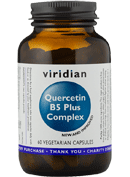
Viridian Quercetin with Vitamin B5 60 Capsules
What are the effects of Quercetin and Vitamin B5 Complex?
Viridian’s Quercetin and B5 complex is a unique combination of nutrients including quercetin, pine bark extract, bromelain and vitamin C for immune and antioxidant support. This highly absorbable vegan formulation has been created for those looking to live a more active lifestyle, especially during the spring and summer months.
Quercetin is a non-citrus bioflavonoid found in many fruits and vegetables. Viridian’s Quercetin is extracted from the flowers of Sophora japonica - a particularly bioavailable form of this natural plant pigment. Vitamin B5 contributes to normal mental performance and a reduction in tiredness and fatigue. Vitamin B5 also contributes to the normal synthesis and metabolism of steroid hormones, vitamin D and some neurotransmitters.
Vitamin C plays a crucial role in many parts of the body, including the support of normal psychological function and iron absorption. In addition, this complex includes Bromelain, a protease compound that is naturally found in pineapples.
two vegetarian capsule provide:
Urtica dioica) extract (4:1) Matricaria recutita) Malphigia glabra)
| Ingredient | Weight | %EC NRV |
| Quercetin | 300 mg | |
| Vitamin B5 (Calcium pantothenate) | 150mg | 2499 |
| Nettle leaf ( | 100mg | |
| Pine bark extract (95% OPC) | 100mg | |
| Chamomile flower ( | 100mg | |
| Vitamin C (Magnesium ascorbate) | 50mg | 63 |
| Bromelain (1200gdu/g) | 50mg | |
| Acerola fruit ( | 25mg |
